- Home
- Michael Grant
Lies Page 2
Lies Read online
Page 2
But Derek’s sister, Jill, was not a normal person.
Beautiful songs could sometimes take a person out of themselves and carry them away to a place of magic. But when Jill sang, it was not about the song, really. She could sing the phone book. She could sing a shopping list. Whatever she sang, whatever the words or the tune, it was so beautiful, so achingly lovely, that no one could listen and be untouched.
He wanted to go to sleep.
He wanted to have all the pretty little ponies.
While she sang, that was all he wanted. All he had ever wanted.
Derek had made sure the windows were shut. Because when Jill sang, every person within hearing came to listen. They couldn’t help it.
At first neither of them had understood what was happening. Jill was just nine years old, not a trained singer or anything. But one day, about a week ago, she’d started singing. Something stupid, Derek recalled. The theme song to The Fairly OddParents.
Derek had stopped dead in his tracks. He’d been unable to move. Unable to stop listening. Grinning at the rapid-fire list of Timmy’s wishes, wanting each of those things himself. Wanting his own fairy godparents. And when at last Jill had fallen silent, it was like he was waking up from the most perfect dream to find himself in a gray and awful reality.
It took only a day or so before Derek figured out that this was no ordinary talent. He’d had to face the fact that his little sister was a freak.
It was a terrifying discovery. Derek was a normal. The freaks—people like Dekka, Brianna, Orc, and especially Sam Temple—scared him. Their powers meant they could do whatever they wanted. No one could stop them.
Mostly the freaks acted okay. Mostly they used their powers to do things that needed doing. But Derek had seen Sam Temple in the middle of a fight. Sam against that other mega-freak, Caine Soren. They had destroyed a big part of the town plaza trying to kill each other. Derek had curled up in a ball and hidden as best he could while that battle raged.
Everyone knew the freaks thought they were special. Everyone knew they got the best food. You never saw a freak reduced to eating rat meat. You never saw a freak eating bugs. A few weeks earlier, when the hunger was at its worst, Derek and Jill had done that. They’d caught and eaten some grass-hoppers.
Freaks? They never had to sink that low. Everyone knew that. At least that’s what Zil said.
And why would Zil lie?
And now Derek’s own little sister was one of them. A mutant. A freak.
But when she sang…when she sang, Derek was no longer in the dark and desperate FAYZ. When Jill sang, the sun was bright and the grass was green and a cool breeze blew. When Jill sang, their mother and father were there, along with everyone else who had disappeared.
When Jill sang, the nightmare reality of life in the FAYZ faded away to be replaced by the song, the song, the song.
Derek was in that place now, soaring on magical wings toward Heaven.
When I die, hallelujah by and by…
A song about death, Derek knew. But so beautiful when Jill sang it. It pierced his heart.
Oh how glad and happy when we meet…
Oh how happy, even though they sat in the dark in a house full of sad memories.
The beam of light was startling.
Jill stopped singing. It was devastating, that silence.
The beam of light shone through the gauzy curtains. It played around the room. Found Derek’s face. Then swiveled until it had lit up Jill’s freckled face and turned her blue eyes glassy.
The front door of the house flew open with a crash. The strike plate shattered.
The intruders spoke no words as they rushed in. Five boys carrying baseball bats and tire irons. They wore an assortment of Halloween masks and stocking masks.
But Derek knew who they were.
“No! No!” he cried.
All five boys wore bulky shooter’s earmuffs. They couldn’t hear him. But more importantly, they couldn’t hear Jill.
One of the boys stayed in the doorway. He was in charge. A runty kid named Hank. The stocking pulled down over his face smashed his features into Play-Doh, but it could only be Hank.
One of the boys, fat but fast-moving and wearing an Easter Bunny mask, stepped to Derek and hit him in the stomach with his aluminum baseball bat.
Derek dropped to his knees.
Another boy grabbed Jill. He put his hand over her mouth. Someone produced a roll of duct tape.
Jill screamed. Derek tried to stand, but the blow to his stomach had winded him. He tried to stand up, but the fat boy pushed him back down.
“Don’t be stupid, Derek. We’re not after you.”
The duct tape went around and around Jill’s mouth. They worked by flashlight. Derek could see Jill’s eyes, wild with terror. Pleading silently with her big brother to save her.
When her mouth was sealed, the thugs pulled off their shooter’s earmuffs.
Hank stepped forward. “Derek, Derek, Derek,” Hank said, shaking his head slowly, regretfully. “You know better than this.”
“Leave her alone,” Derek managed to gasp, clutching his stomach, fighting the urge to vomit.
“She’s a freak,” Hank said.
“She’s my little sister. This is our home.”
“She’s a freak,” Hank said. “And this house is east of First Avenue. This is a no-freak zone.”
“Man, come on,” Derek pleaded. “She’s not hurting anyone.”
“It’s not about that,” a boy named Turk said. He had a weak leg, a limp that made it impossible not to recognize him. “Freaks with freaks, normals with normals. That’s the way it has to be.”
“All she does is—”
Hank’s slap stung. “Shut up. Traitor. A normal who stands up for a freak gets treated like a freak. Is that what you want?”
“Besides,” the fat boy said with a giggle, “we’re taking it easy on her. We were going to fix her so she could never sing again. Or talk. If you know what I mean.”
He pulled a knife from a sheath in the small of his back. “Do you, Derek? Do you understand?”
Derek’s resistance died.
“The Leader showed mercy,” Turk said. “But the Leader isn’t weak. So this freak either goes west, over the border right now. Or…” He let the threat hang there.
Jill’s tears flowed freely. She could barely breathe because her nose was running. Derek could see that by the way she sucked tape into her mouth, trying for air. She would suffocate if they didn’t let her go soon.
“Let me at least get her doll,” Derek said.
“It’s Panda.”
Caine rose through layers of dream and nightmare, like pushing his way through thick curtains that draped his arms and legs and made his every move tiring.
He blinked. Still dark. Night.
The voice had no obvious source, but he recognized it, anyway. Even if there had been light he might not have seen the boy with the power to fade away and almost disappear. “Bug. Why are you bothering me?”
“Panda. I think he’s dead.”
“Have you checked his breathing? Listened to his heart?” Then another thought occurred to him. “Why are you waking me up to tell me someone’s dead?”
Bug didn’t answer. Caine waited, but Bug still couldn’t say it out loud.
“Do what you gotta do,” Caine said.
“We can’t get at him. He didn’t just die. He got in the car, right? The green one?”
Caine shook his head, trying to wake up all the way, trying to make the trip back to full consciousness. But the layers of dream and nightmare, and memory, too, dragged at him, confused his brain.
“There’s no gas in that car,” Caine said.
“He pushed it. Till it got rolling,” Bug said. “Then he jumped in. It rolled on down the road. Until he got to the bend.”
“There’s a railing there,” Caine said.
“He went through it. Crash. Bumpety-bump all the way down. It’s a long way down. Me and
Penny just climbed down, so I know it’s a long way down.”
Caine wanted this to stop. He didn’t want to have to hear the next part. Panda had been okay. Not a horrible kid. Not like some of Caine’s few remaining followers.
Maybe that explained why he would drive a car off a cliff.
“Anyway, he’s totally dead,” Bug said. “Me and Penny got him out. But we can’t get him up the cliff.”
Caine got to his feet. Legs shaky, stomach like a black hole, mind filled with darkness. “Show me,” he said.
They walked out into the night. Feet crunched on gravel now interrupted by tall weeds. Poor old Coates Academy, Caine thought. It had always been so meticulously maintained back in the old days. The headmaster would definitely not have approved of the big blast hole in the front of the building, or the garbage strewn here and there in the overgrown grass.
It wasn’t a long walk. Caine did not speak. He used Bug sometimes; Bug was useful. But the little creep was not exactly a friend.
In the pearly starlight it was easy to see where the railing had been ripped apart. It was like a steel ribbon, cut then left half curled, dangling over the side.
Caine peered through the darkness. He could see the car. It was upside down. One door was open.
It took a few minutes for him to locate the body.
Caine sighed and raised his hands. It was near the limits of his range, so Panda didn’t come flying up off the ground. He sort of scuffed and scooted along at first. Like an invisible predator was hauling him away to its lair.
But then Caine got a better “grip” and Panda rose off the ground. He was on his back, staring up at the unreal stars, eyes still open.
Caine levitated the boy up from the crash, up and up until he brought him to as gentle a stop as he could. Panda lay now on the road.
Without a word, Caine started walking back to Coates.
“Aren’t you going to carry him back?” Bug whined.
“Get a wheelbarrow,” Caine said. “Carry your own meat.”
THREE
63 HOURS, 31 MINUTES
THE WHIP CAME down.
It was made of flesh, but in his nightmare it was a snake, a writhing python that sliced the flesh from his arms and back and chest.
The pain was too terrible to endure. But he had endured it.
He had begged for death. Sam Temple had begged to die. He had begged the psychopath to kill him, to end it, to give him the only relief possible.
But he had not died. He had endured.
Pain. Too small a word. Pain and awful humiliation.
And the whip kept coming down, again and again, and Drake Merwin laughed.
Sam woke up in a bed of tangled, sweat-soaked sheets.
The nightmare did not leave him. Even with Drake dead and buried under a mountain of rock, he had Sam under the control of his whip hand.
“Are you okay?”
Astrid. Almost invisible in the darkness. Only the faintest starlight filtered through the window and framed her as she stood there in the doorway.
He knew what she looked like. Beautiful. Compassionate, intelligent blue eyes. Blond hair all wispy and wild since she’d just gotten up from her own bed.
He could picture her all too easily. A picture more detailed than real life. He often pictured her as he lay alone in his bed. Far too often, and for too long. Too many nights.
“I’m fine,” Sam lied.
“You were having a nightmare.” It wasn’t a question.
She came in. He could hear the rustle of her nightgown. He felt her warmth as she sat at the edge of his bed. “The same one?” she asked.
“Yeah. It’s getting kind of boring now,” he joked. “I know how it ends.”
“It ends with you alive and well,” Astrid said.
Sam said nothing. That had been the outcome: He had survived. Yes, he was alive. But well?
“Go back to sleep, Astrid,” he said.
She reached for him, fumbled just a little, unable to find his face. But then her fingers touched his cheek. He turned away. He didn’t want her finding the wetness there. But she wouldn’t let him push her hand away.
“Don’t,” he whispered. “You just make it harder.”
“Is that a joke?”
He laughed. The tension broke. “Well, not an intentional one.”
“It’s not that I don’t want to, Sam.” She bent over and kissed his mouth.
He pushed her away. “You’re trying to distract me. Make me think about something else.”
“Is it working?”
“Yes, I’d say it’s working very well, Astrid.”
“Time for me to go.” She stood up and he heard her moving away.
He rolled out of bed. His feet hit the cold floor. “I need to do a walk-through.”
She stopped in the doorway. “Sam, I heard you come in two hours ago. You’ve had almost no sleep. And it will be dawn in a couple of hours. The town will survive that long without you. Edilio’s kids are on duty.”
Sam pulled on a pair of jeans and zipped them up. He considered telling her about Orsay, about this latest craziness. But there would be time for that later. No rush.
“There are things out there that Edilio’s guys can’t handle,” Sam said.
“Zil?” Astrid said. The warmth was rapidly draining out of her voice. “Sam, I despise Zil as much as you do. But you can’t take him on yet. We need a system. Zil is a criminal, basically, and we need a system.”
“He’s a punk creep, and until you come up with your great system, someone needs to keep an eye on him,” Sam snapped. Before Astrid could react angrily to his tone, he said, “Sorry. I didn’t mean to take it out on you.”
Astrid came back into the room. He hoped it was because she was just too attracted to him to leave, but that wasn’t it. He could barely see her but could hear and feel that she was very close.
“Sam. Listen. It’s not all on your shoulders anymore.”
“You know, I seem to remember a time when you were all in favor of me taking on the responsibility,” Sam said. He pulled a T-shirt over his head. It was stiff with salt and smelled like low tide. That’s what happened when you washed clothes in salt water.
“That’s right,” Astrid said. “You’re a hero. You are without a doubt the biggest hero we have. But, Sam, we’re going to need more in the long run. We need laws and we need people to enforce laws. We don’t need…” She stopped herself just in time.
Sam made a wry face. “A boss? Well, it’s just kind of hard to adjust that quickly. One day I’m just me, minding my business. Then the FAYZ comes and suddenly everyone is telling me to step up. And now you all want me to back off.”
Orsay’s words came back to him, up from the fuzzy, sleepy recesses of his memory. The true hero knows when to walk away. It could have just as easily been Astrid saying that.
“I want you to go back to bed is all,” Astrid said.
“I know how you can get me to go back to bed,” he teased.
Astrid pushed him playfully, palm on his chest. “Nice try.”
“Truth is, I can’t go back to sleep now, anyway,” Sam said. “I might as well take another walk.”
“Well, try not to kill anyone,” Astrid said.
It was meant as a joke, but it bothered Sam. That’s what she thought of him? No, no, it was just a joke.
“Love you,” he said as he headed for the steps.
“Me too,” she said.
Dekka never remembered dreams. She was sure she had them because sometimes she woke up with a shadow on her mind. But she never really recalled details. The dreams or nightmares must have come—they said everyone dreamed, even dogs—but all Dekka retained was a sense of foreboding.
Her dreams—and her nightmares—were all in the real world.
Dekka’s parents had sent her away. They’d sent her to Coates Academy, a boarding school for troublesome kids. In Dekka’s case the “trouble” was not the few incidents of misbehavior she’d b
een involved in. Nor was it the occasional fight—Dekka had a habit of defending girls who had no other defender, and sometimes that resulted in a confrontation. Nine times out of ten, the fights went nowhere. Dekka was big and strong and fearless, so bullies usually found an excuse to walk away once they realized Dekka wouldn’t. But on half a dozen occasions blows had been traded.
Dekka won some and lost some.
But the fights weren’t the problem for her parents. Dekka’s parents had taught her to stand up for herself.
The problem had been a kiss. A teacher had seen her kissing a girl and had called her parents. It wasn’t even at school. It was in a parking lot outside a Claim Jumper Restaurant.
Dekka remembered every detail of that kiss. It was her first. It had scared her like nothing before ever had. And later, when she’d caught her breath, it had excited her like nothing before ever had.
It had upset her parents. To put it mildly. Especially when Dekka used the “L” word openly for the first time. Her father was not going to have a lesbian daughter. He’d put it quite a bit more crudely than that. He had slapped her face, hard, twice. Her mother had stood there dithering and ineffectual, saying nothing.
So it was off to Coates to be with fellow students who ranged from decent kids whose parents just wanted to be rid of them, all the way to the brilliant, manipulative bully, Caine, and his creep of a henchman, Drake.
Her parents imagined she would be under constant discipline. After all, Coates had a reputation for fixing damaged kids. And a part of Dekka wanted to be “fixed” because that would make life so much easier. But she had never chosen to be what she was, any more than she had chosen to be black. There was no “fixing” her.
But at Coates, Dekka had met Brianna. And all thought of changing herself, of becoming “normal,” evaporated.
She had fallen in love with Brianna at first sight. Even back then, long before Brianna became “the Breeze,” she had a swagger and a style that Dekka found irresistible. A feeling she had never shared with Brianna. Probably never would.
Where Dekka was gloomy and internal, Brianna was loud, brash, and reckless. Dekka had looked for some evidence that Brianna might be gay, too. But when she was honest, Dekka had to admit that this didn’t seem to be the case.

 Fear
Fear Plague
Plague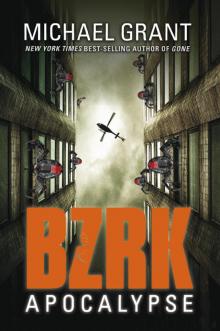 BZRK: Apocalypse
BZRK: Apocalypse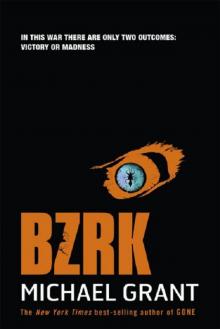 Bzrk
Bzrk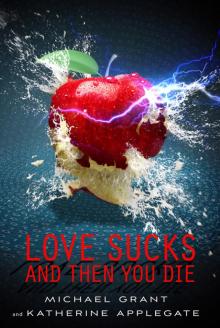 Love Sucks and Then You Die
Love Sucks and Then You Die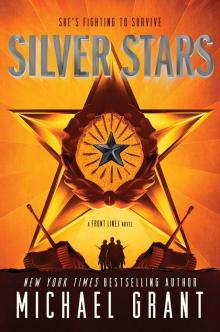 Silver Stars
Silver Stars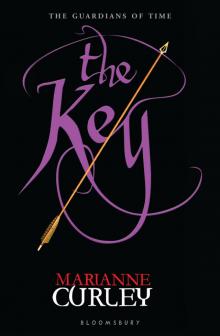 The Key
The Key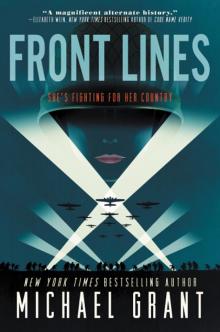 Front Lines
Front Lines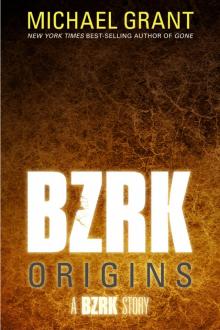 BZRK Origins
BZRK Origins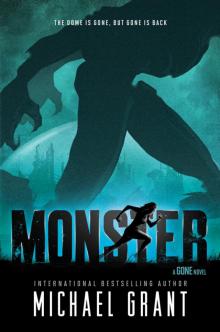 Monster
Monster Gone
Gone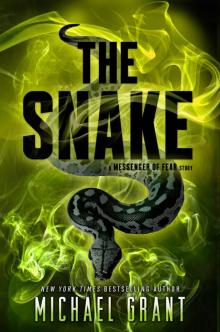 The Snake
The Snake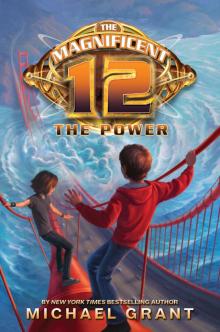 The Power
The Power Hunger
Hunger Lies
Lies A Sudden Death in Cyprus
A Sudden Death in Cyprus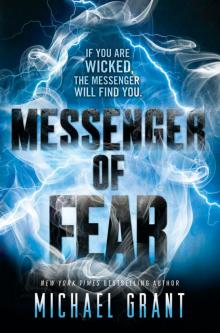 Messenger of Fear
Messenger of Fear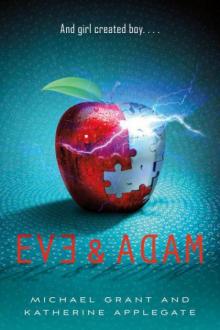 Eve & Adam
Eve & Adam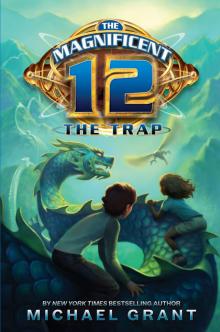 The Trap
The Trap Light
Light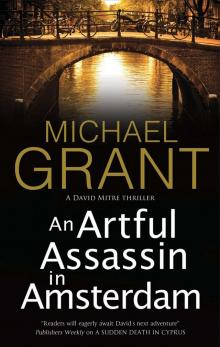 An Artful Assassin in Amsterdam
An Artful Assassin in Amsterdam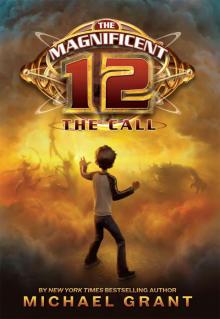 The Call
The Call Hero
Hero Soldier Girls in Action
Soldier Girls in Action Purple Hearts
Purple Hearts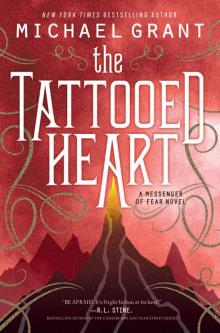 The Tattooed Heart
The Tattooed Heart The Fall of the Roman Empire
The Fall of the Roman Empire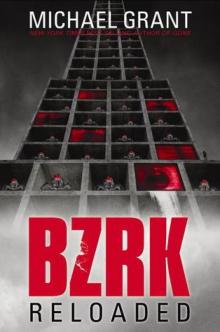 BZRK Reloaded
BZRK Reloaded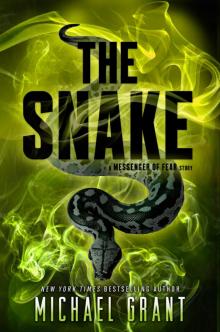 Messenger of Fear Novella #1
Messenger of Fear Novella #1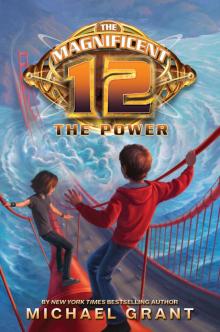 The Magnificent 12
The Magnificent 12 Fear: A Gone Novel
Fear: A Gone Novel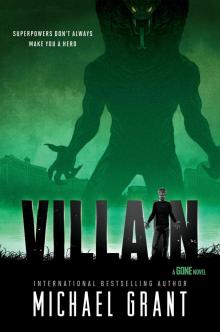 Villain
Villain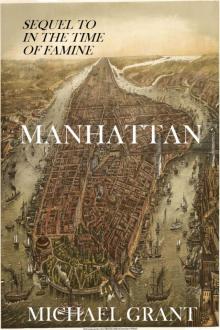 Manhattan
Manhattan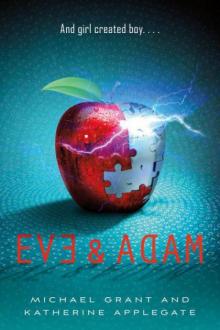 Eve and Adam
Eve and Adam Plague: A Gone Novel
Plague: A Gone Novel Fergie Rises
Fergie Rises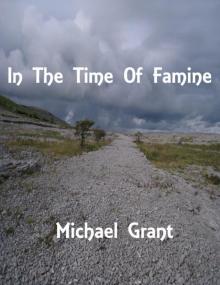 In the Time of Famine
In the Time of Famine Hunger_A Gone Novel
Hunger_A Gone Novel Lies g-3
Lies g-3